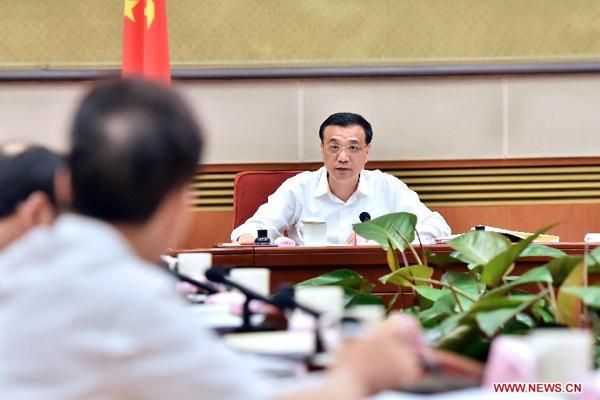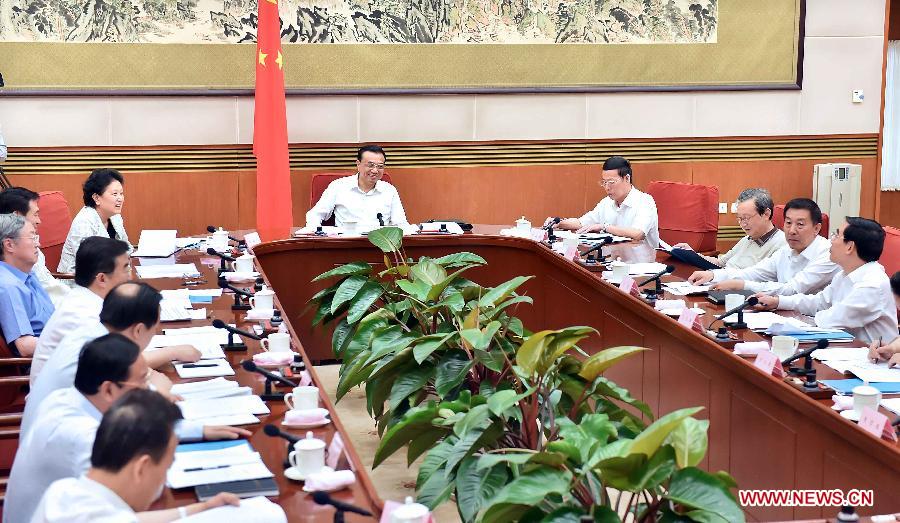
Premier Li Keqiang, also a member of the Standing Committee of the Political Bureau of the Communist Party of China (CPC) Central Committee, presides over a symposium on the economic work of some provinces and municipalities, in Beijing, capital of China, June 4, 2014. [Photo/Xinhua]
Acknowledging downward pressure on the economy, Premier Li Keqiang on June 4 urged central and local authorities to actively and fully implement reform policies.
“To achieve the development goals for 2014, we should better mobilize efforts from both the central and local authorities,” Li said at an economic conference.
While noting China’s economic growth, employment and inflation are all within a proper range, Li said risks and challenges are not to be overlooked as downward pressure remains “relatively high”.
China’s economy grew at its weakest pace in 18 months in the first quarter, expanding by 7.4 percent, lower than the 7.5 percent target, but there are signs that the economy may be gaining strength. Growth in the manufacturing sector continued to accelerate in May, hitting a five-month high that pointed to a stabilizing economy.
Li stressed that development remains the major task, and urged authorities to implement policies already in place and make targeted moves to address new problems to achieve the year’s economic and social goals.
Local authorities should continue to streamline functions and delegate power to lower levels to facilitate investment, job creation and employment, he said.
“The main engine is the market, and the government should play a guiding and helping role,” Li said, urging more support to emerging industries, the private economy and micro-enterprises.
Projects related to social welfare, such as transportation, water facilities in the less developed central and west regions, and slum renovation should be given more prominence, Li said.
To support the faltering economy, the central government has unveiled a string of measures to try to steady growth near its target of 7.5 percent without disrupting plans to restructure the economy or worsening problems of overcapacity and debt.
These so-called “targeted” measures include cutting reserve requirement ratios (RRR) for rural banks, speeding up railway and public housing construction, and tax breaks for small businesses.

Premier Li Keqiang (C), also a member of the Standing Committee of the Political Bureau of the Communist Party of China (CPC) Central Committee, presides over a symposium on the economic work of some provinces and municipalities, in Beijing, capital of China, June 4, 2014. Vice-Premier Zhang Gaoli (4th R), who is also a member of the Standing Committee of the Political Bureau of the CPC Central Committee, also attended the symposium. [Photo/Xinhua]
The State Council earlier this month announced additional policy easing measures, promising to increase “targeted” monetary and credit easing, lower corporate financial burdens and accelerate policy implementation.
More specifically, China will lower RRR for banks whose lending is geared toward the real economy, especially small businesses and the farming sector, according to a statement issued after a cabinet meeting.
To ensure the policies are properly carried out, the State Council will start a comprehensive inspection, and those found neglectful of their duty will be held responsible.
The country will focus on important issues in the economy, and make efforts to tackle them in a “precise, prompt and appropriate” manner, the premier said.
Meanwhile, presetting and fine-tuning economic policies will be carried out along with risk prevention, said the premier while addressing the nation’s top academicians and scientists at a conference in Beijing.
Li said that the country will continue to innovate its macro-control ideologies, draw economic momentum from reforms and restructuring, and improve people’s livelihoods.
Li acknowledged that the economy still faces heavy downward pressure and imbalanced regional development. The Chinese economy grew 7.4 percent year-on-year in the first quarter, marking the weakest pace in 18 months. The country aims for an annual growth rate of around 7.5 percent for 2014.
However, a growing consumption market at home and the processes of industrialization, informatization, urbanization and agricultural modernization boast great potentials, said the premier, adding the country will have the capabilities to maintain medium to high level of economic growth for a long period.
To achieve the goal, innovation is a must to drive growth toward better quality and greater efficiency, and lift the economy higher on the value chain.
The government will continue to beef up fiscal support, to encourage enterprises to concentrate more on research and development, the premier said.
Targeting support for agriculture and small companies, the central bank announced on Monday that it will cut the reserve requirement ratio by 0.5 percentage points for the banks engaged in proportionate lending to the farming sector or small and micro-sized enterprises, effective on June 16.
